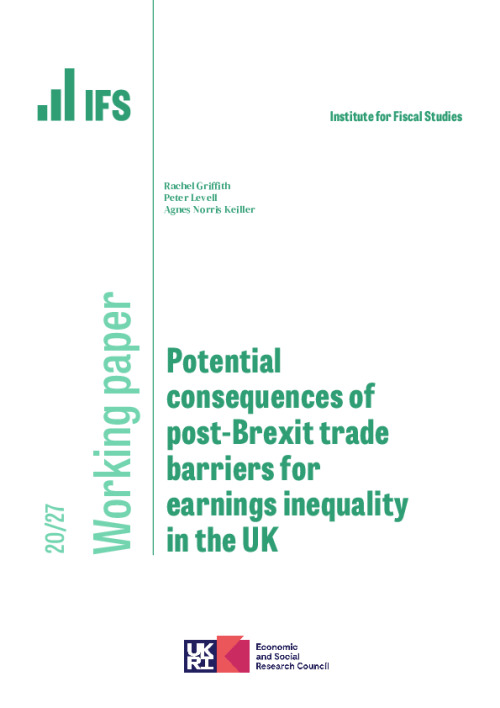Downloads
We examine the distributional consequences of post-Brexit trade barriers on wages in the UK. We quantify changes in trade costs across industries accounting for input-output links across domestic industries and global value chains. We allow for demand substitution by firms and consumers and worker reallocation across industries. We document the impact at the individual and household level. Blue-collar workers are the most exposed to negative consequences of higher trade costs, because they are more likely to be employed in industries that face increases in trade costs, and are less likely to have good alternative employment opportunities available in their local labour markets. Overall new trade costs have a regressive impact with lower-paid workers facing higher exposure than higher-paid workers once we account for the exposure of other household members.
Authors

CPP Co-Director, IFS Research Director
Rachel is Research Director and Professor at the University of Manchester. She was made a Dame for services to economic policy and education in 2021.

Associate Director
Peter joined in 2009. He has published several papers on the microeconomics of household spending and labour supply decisions over the life-cycle.

Agnes Norris Keiller
Working Paper details
- DOI
- 10.1920/wp.ifs.2020.2720
- Publisher
- The IFS
Suggested citation
R, Griffith and P, Levell and A, Norris Keiller. (2020). Potential consequences of post-Brexit trade barriers for earnings inequality in the UK. London: The IFS. Available at: https://ifs.org.uk/publications/potential-consequences-post-brexit-trade-barriers-earnings-inequality-uk (accessed: 30 June 2024).
More from IFS
Understand this issue

Big firm, little firm: are differences between companies driving inequality and holding back growth?
30 August 2023

Still a man’s world? Gender inequalities, parenthood and the workplace
23 August 2023

Cuts to council services likely unless cost pressures abate – even with the biggest council tax increases for 20 years
21 June 2024
Policy analysis

How do the last five years measure up on levelling up?
19 June 2024

The Conservatives and the Economy, 2010–24
3 June 2024

A decade and a half of historically poor growth has taken its toll
3 June 2024
Academic research

The impact of labour demand shocks when occupational labour supplies are heterogeneous
28 June 2024

Labour market inequality and the changing life cycle profile of male and female wages
15 April 2024

Interpreting cohort profiles of lifecycle earnings volatility
15 April 2024
